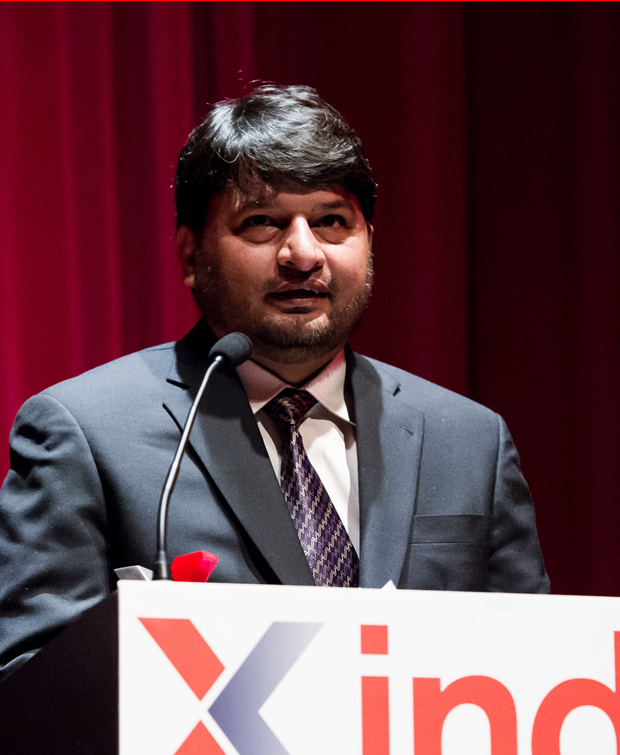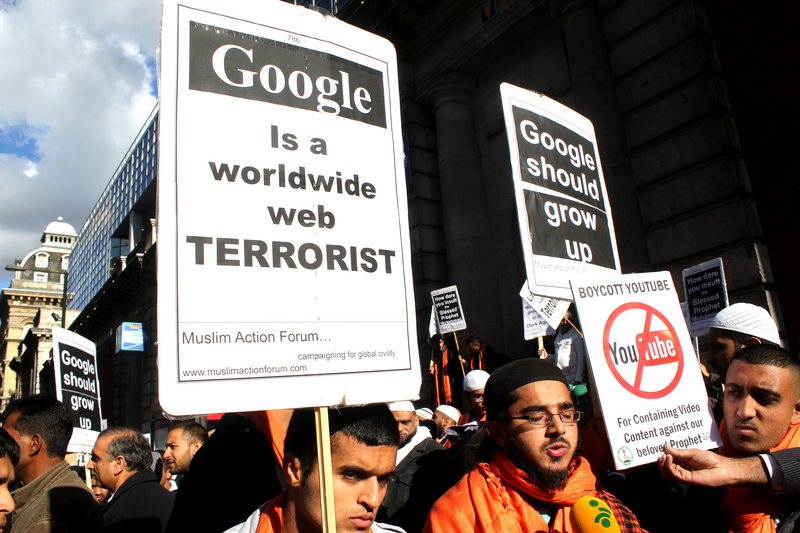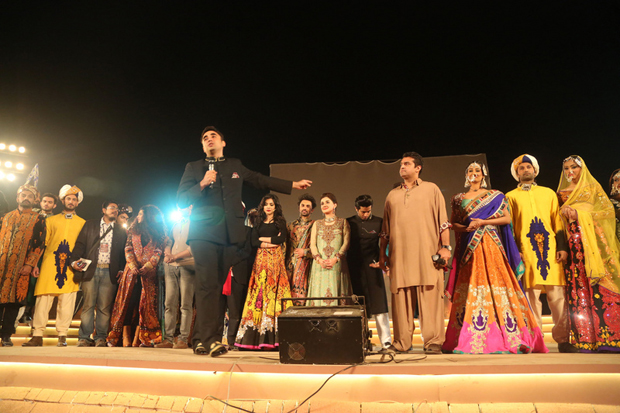27 Feb 2014 | Awards, News and features, Pakistan

Shahzad Ahmad accepting his award (Photo: Alex Brenner for Index on Censorship)
Index Freedom of Expression Awards: Advocacy nominee Shahzad Ahmad from IndexOnCensorshipTV on Vimeo.
Shahzad Ahmad is one of the leading voices in the fight against online censorship in Pakistan. The country faces a deteriorating state of cyber freedom, as the government uses draconian censorship laws and increasing surveillance to police the internet.
Ahmad is country director of Bytes4All. The group campaigns for internet rights and democracy by building capacity for human rights defenders, as well as advocacy and awareness-raising.
Ahmad and Bytes4All have sued the Pakistani government over the suspected use of surveillance software, FinFisher – a piece of software that infects a computer and takes full control of it, intercepting Skype calls and allowing every keystroke the user types to be sent across the internet to another computer. Developed by UK-based company Gamma International, it has been used to target activists in Bahrain amongst other countries. He is also suing the government over its ongoing blocking of YouTube which deprives the country of one of the world’s most popular video channels.
Nominees: Advocacy | Arts | Digital Activism | Journalism
Join us 20 March 2014 at the Barbican Centre for the Freedom of Expression Awards
In a recent article, Shahzad wrote: “We want to be a proud democracy, so we need to uphold democratic principles and for that we want Pakistan to be tolerant and moderate. But Government oppression is rising day by day. Censorship happens because of moral policing, corruption and because the authorities do not want to be transparent. They don’t want to give citizens freedom of information or permission to question them.”
This article was posted on March 3, 2014 at indexoncensorship.org
27 Feb 2014 | News and features

The Innocence of Muslims is truly the free speech story that keeps on giving. The crude, cheaply made anti-Islam film sparked international outrage when it first appeared on YouTube in September 2012, with even President Obama forced to weigh into the debate after the US Embassy in Cairo issued a tweet “condemning” the video. While ostensibly supporting free speech, the White House did suggest that Google should examine whether the video contravened its own terms of service.
Google eventually blocked the video of its own accord in Libya and Egypt. Meanwhile, in its move to censor the film, Pakistan simply blocked the whole of YouTube.
Now, a US court has ruled that Google should remove the video from YouTube. Not because of blasphemy, but because of copyright. The case against Google and the makers of the film was brought by actress Cindy Lee Garcia, who appears in the film for all of five seconds. Garcia claims that her single line, suggesting that Muhammad was a “child molester” was dubbed, and that she was duped into appearing in the anti-Muslim film, having been told it was a trailer for an adventure movie.
Crucially, she also says that she has a claim to the copyright of the film. The Ninth Circuit Court of Appeals agreed that she may have a claim, and on 19 February ordered Google to remove the film from its YouTube service.
The court further ordered that the ruling be kept secret until 26 February, when the 37-page opinion on the case was issued “to prevent a rush to copy and proliferate the film before Google can comply with the order.”
Google has said it will appeal the order, saying that not only could the copyright claim of a bit-part actor create havoc for filmmakers of the future, but that service providers could now also be swamped with takedown requests from people who regret appearing in works in the public domain.
Interestingly, it also suggests that the simple removal of the video could constitute a tampering with the historical record. That chimes with an argument Index has made before – we seem far more comfortable with the removal of web content than we do with, say, the pulping of books, even though the intent is the same.
As things stand, Google has complied with the order, and the Innocence of Muslims can no longer be found on YouTube.
In yet another twist, Pakistani web freedom campaigner and Index on Censorship award nominee Shahzad Ahmed has used the removal of the video to pressure his government to lift the YouTube ban.
“We think that now the government of Pakistan has been left with no excuse to continue blocking access to YouTube,” he is reported as saying. “But the ban on YouTube has got more to do with the government’s desires and efforts to impose censorship, content filtering and moral policing and we are fighting against them in court through a constitutional petition.”
This article was posted on February 27, 2014 at indexoncensorship.org
22 Feb 2014 | Asia and Pacific, Pakistan
TARGET – Episode No.190 by aajnews
Pakistan’s media has become increasingly powerful in the decade and a half since then-president Pervez Musharraf eased restrictions on new TV channels. The move sparked a boom in channels that hasn’t slowed and has encouraged the pursuit of ratings and viewers.
The crowded broadcast media market has driven the networks to cover lavish weddings during their morning shows, or dissect domestic disputes between husbands, wives and mothers in law. But more importantly and tragically, the networks are filling with shows aimed at “policing” women in this conservative nation.
While in the families, fathers, brothers, uncles, husbands, and other male-figures make sure that women don’t do any jobs or say anything that affects family name, in the working places too, policing of women is common. From telling them how to dress to how to be soft-spoken and more feminine, the trend of considering women as some property is prevalent.
So too with the media. A recent episode the show Target, broadcast on Aaj TV made many liberals cringe.
Under the guise of protecting Muslim values, the show’s producers and host broke laws while behaving like a proxy police force.
The Aaj TV team swooped on an apartment where they had heard women were involved in prostitution, which is illegal in Pakistan. The video then shows the programme’s host making a fake call to get his team member inside the apartment. Later — after the police break the lock on the door without showing a warrant — the host berated the women inside. “I know women like you” he yells.
While the show’s host Syed Shahryar Asim does claims he could go ater all the powerful people who frequent the brothel, he never names them. Perhaps it is easier to intimidate helpless women than the influential men who actually back the brothels.
At the end of the programme, Superintendent Police (SP) Ali Asif advises people to call 15 to report illegal or illicit activity. While in a civilised country, that would be the way to report criminal activities, in Pakistan, apparently, investigations and trials are carried out by the media. Be it some case to be handled by police, parliament or Supreme Court, Pakistan’s eager media anchors have taken it on themselves to police, stalk and harass anyone in their way.
For women featured in these reports the consequences can be terribly serious.
– The video in Urdu can be watched from this link.
This article was posted on 25 February 2014 at indexoncensorship.org
4 Feb 2014 | News and features, Pakistan, Politics and Society

PPP Chairman Bilawal Bhutto Zardari addresses the opening ceremony of the Sindh Festival on 1 February (Photo: Jamal Dawoodpoto / Demotix)
Hoping to use culture to battle Pakistan’s slide into “Talibanisation”, the son of Benazir Bhutto kicked off a two-week-long arts festival on 1 February to offer an alternative to what is perceived here as dithering by prime minister Nawaz Sharif, who announced he was giving “peace another chance”.
After a spate of violent attacks in January, Pakistanis assumed Sharif would crack down on the Taliban with an iron fist. However, in a speech on 29 January, Sharif opted to promote talks instead. Critics immediately pointed out the repeated violations of peace accords signed by the Taliban.
Finding it a “characteristic feature” of Pakistani politics on matters of national security, Ambreen Agha, a research assistant with New Delhi’s Institute for Conflict Management said: “Mr Sharif finds it convenient to keep the nation busy with his idle pursuit of rhetoric, with nothing concrete being done.”
Among the many who are tired of hearing about the peace talks with the Taliban is 25-year old Bilawal Bhutto Zardari — the son of the assassinated former prime minister — who believes Pakistan has “exhausted the option of talks”, arguing that the militants need to be beaten “on the battlefield”. He recently put forth his point of view to BBC’s Lyce Doucet.
Despite threats from the Taliban and other armed groups, Zardari, who is also the chairperson of the Pakistan People’s Party (PPP), has begun waging a war of words against them where others have been silenced. He has urged politicians to “wake up” to the looming threat and unite against the Taliban.
“Though Bilawal’s idea of political will sounds positive, I doubt that this idea is there to stay,” said Agha and added: “Like many of his predecessors he is susceptible to fall on the same track of delays and betrayals. But, if he is willing to take the bull by the horns, which in my opinion is not even a rudimentary possibility, he needs the much called for political will.”
Zardari is spearheading the cultural festival. In a televised advertisement, in which he is seen as a head of state addressing a nation, he is declaring a “cultural coup” to fight the threat posed by the Taliban to Pakistan’s civilisation. The opening ceremony extravaganza that started with a light and music show at one of world’s ancient ruins of Mohenjo Daro — much to the disapproval of conservationists — included kite-flying, donkey cart races, cricket matches, fashion shows, theatre, music and literature.
But many in Pakistan refuse to take him seriously. He is often scoffed at for his anglicised Urdu accent, his exile in Dubai and London and his English education. Critics believe his sudden passion for reviving Sindh’s culture is misplaced.
Agha finds him “distanced from his own society, standing on a pedestal too high to be reached”.
“Of course there is a lot of criticism of him and many consider him out of touch of with reality,” agreed Islamabad-based independent journalist, Taha Siddiqui, but added: “His coming back and making this effort…it’s commendable…”
Siddiqui has been travelling the length and breadth of Pakistan for the last several years and has seen the “creeping radicalisation and religious extremism” in not just Sindh but all over the country.
While he believes the festival such as the one organised by Zardari will be a small step, more needs to be done to stem rising extremism, like revamping of school curriculum, checks and balances on religious seminaries, and for the state to clearly label the Taliban as the enemy which it has so far been unable to do.
“Unless all of these and such other measures are taken together, we will see Pakistan moving further down the trap of Talibanisation,” Siddiqui concluded.
Conceding to a need for a more holistic approach to fight Talibanisation, Agha said that while the cultural synthesis may rejuvenate the lost cultural ethos and values of Sindh, the PPP chairperson will have to “penetrate deeper into the layers of Pakistani society and address the issues that bind the people culturally.”
This article was posted on 3 Feb 2014 at indexoncensorship.org



